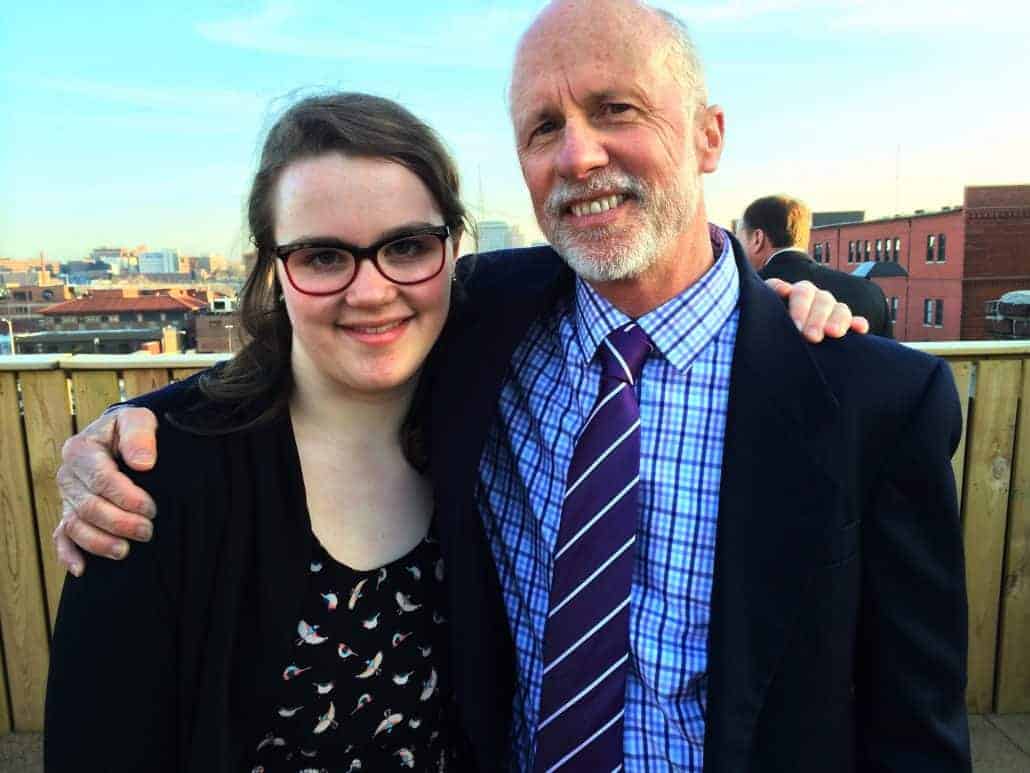A Father’s Love for his Daughter: Finding Hope at SRNA Family Camp
By Nate Budington
On the fourth night of my daughter’s sudden hospitalization, when the diagnosis of transverse myelitis seemed pretty definitive, I was sitting in a spare wheelchair at the end of the corridor of Boston Children’s Hospital, staring out of a large plate glass window as a blizzard flew into the city. My wife and a nurse were attending to Ella and I was sent out of the room. In that seat, by the window, hearing the beeps and alarms of all that medical equipment in all those children’s rooms, I wondered how I–how we–were ever going to survive this emerging catastrophe. On Thursday, she and her brother ran out the door to catch the school bus, and by Sunday my wife and I were alternating between panic and despondency, hanging onto every small piece of hope we were offered. I acknowledged that some parents on our wing were facing something far more profound than paralysis, but at that moment, alone by myself, in tears, and at the mercy of an immune system gone haywire, I had never felt so completely isolated and untethered. One day all is good, the next day you’re falling from 36,000’.
We returned home to a welcoming and loving community of friends who made us meals, and had helped with my son while we were two hours away in Boston. They made it very clear they were there for us in any way they could be. The ramp had been built while we were at the hospital, the stair machine installed, the middle school was busily fixing desks and bathrooms, and by the time Ella wheeled into the house for the first time in two months, everything seemed sort of…normal – even if it was a new kind of normal. She transitioned into school amazingly well, and we all settled into life in a way that was oddly not too different than prior to her attack. The fear my wife and I had been battered by for weeks had morphed into a kind of bland acceptance.
But at unexpected moments, with or without Ella at my side, the isolation returned with a vengeance: when I saw teenage girls skipping down the street; when parents from her old swim team would post pictures from swim meets on Facebook; the day I gave her old bike to a friend with a young girl. That’s when I’d say to myself “No one knows what this is like.” I knew that somewhere out there someone did, but not in my life, not in my social orbit.
When we first heard about the SRNA Family Camp, I was intrigued but skeptical. We were secular New Englanders and this was the Bible Belt. Would Ella fit in? Would camp rub her condition in her face or help her find a community? Would we click with the parents? Would we be barraged by zealots offering sketchy “alternative” treatments? I don’t think we ever considered not going, but being a part of a “medical condition community” was new territory for us and we were unsure what camp was going to provide or whether it was worth the effort.
But a community was waiting for us. On the first night, sitting at a picnic table with two parents sharing stories and laughing in the face of this awful thing we are a part of, I felt like I could finally breathe. These people had been in the Transverse Myelitis world for years (for us it was just months) and they were OK. They could laugh. They had perspective. They were living their lives fully. The world wasn’t over. Over the course of four days, that kind of talk happened continually. And when we met with Dr. Greenberg and his colleagues in the afternoons, I realized the value of this community, medically and emotionally.
I’m still not at peace with what’s happened to my daughter, or any of these wonderful kids. I still have my moments of sadness and anger. But we’re much better off because of SRNA Family Camp. My daughter has a family of fellow TMers, and my wife and I know that all the wonderful people we met in Kentucky have our backs as we have theirs.
Enduring your child’s illness is a brutal journey, but the human connections we make along the way–the kinship and support we get from those who are along for the ride–somehow makes things work when you think nothing will. For me, that is the essence of SRNA Family Camp. It’s inspiring to watch these kids face TM with courage. And to believe that you can carry on as a parent with the same humor, balance and wisdom as before–that’s a gift.
SRNA Quality of Life Family Camp is a unique and life changing experience that provides children and families living with rare neuroimmune disorders (ADEM, AFM, NMOSD and TM) a chance to experience the joys of a completely accessible camp and engage with leading medical practitioners so they can be better advocates for their own health. At camp, these children can be themselves, free of fear and stigma and not be reminded of their daily challenges.






